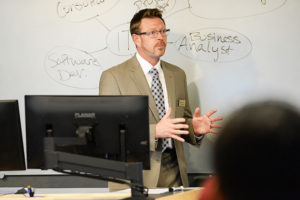
When Mary Kincannon was pursuing her B.F.A. she was optimistic, ready to graduate and dive into the art world. But she soon found herself working grueling shifts in toxic conditions at a print shop, offering a different window into the career she hoped to pursue for the rest of her life.
“There’s this propensity to idealize, and put on a cloud, the idea of what it’s like to be an artist,” Mary said. “I was working 12, 14, 16 hour days, every day a week, including weekends. And it’s just … the reality of it is exhausting, and all of sudden the romance of spending all your time in a print shop becomes a very different thing.”
The passion and energy Mary had for creating her own art began to dissipate. She’d heard from other professionals that to even have a chance at succeeding in the field she would have to make significant sacrifices in her personal life, and still there would be few assurances.
“I was like, ‘I don’t know if this is the best long-term fit.’”
Mary began looking for ways out and managed to find an internship at a publishing company in Loveland, Colorado. Over the next four years she worked her way up in the organization to become a project manager, learning about digital rights management, multi-platform distribution, and contract negotiations. But she eventually ran into a wall: Many of the company’s major initiatives were tied to information technology, from developing e-commerce platforms to creating complex databases, and people who had that knowledge were becoming increasingly valuable.
“I definitely knew that an IT background would be relevant long-term in publishing and media, but also had a really confident gut instinct that it would be relevant across the board,” Mary said. “Every major industry is dealing with similar concerns.”
Finding her next step
Worried about the relevancy of her art degree, Mary came to the realization that she needed to make a change, and that it wasn’t as simple as just moving into another position within the same company.
She started looking at graduate study, wanting a degree path that was open to people without technical backgrounds, had strong business connections, and would allow her to be flexible with her career choices after graduating.
The strength of the College of Business, combined with a manageable number of credits and reasonable tuition costs, made the Master of Computer Information Systems degree at Colorado State University stand out.
Mary knew she didn’t need to become a software engineer, but wanted to have the skills to use technology efficiently and address a broad spectrum of business needs, so she decided to jump in feet first, not knowing exactly what to expect.
“It’s OK – we teach it.”
Mary’s first class started quickly, jumping straight into introductory material.
“I’m not going to lie, that first day is intimidating,” she said. “You don’t know everyone else’s background, you sit in these courses where the professors are obviously quite seasoned and you’re intimidated.”

Mary remembers having a near meltdown when her class got into programming. Worried that she wouldn’t be able to handle the material, she scheduled a meeting with her department advisor, Matt Dunn. That day, she entered his office clearly upset.
“He’s like, ‘OK, deep breath, there’s programming, but it’s ok – we teach it.’”
Her initial shock wore off and Mary realized the skills that had seemed abstract weren’t out of reach but were being shared with her by faculty who cared about seeing their students succeed. It felt empowering.
Completing group work in her first semester courses also helped build relationships between her and her classmates to create the foundation of a strong support network that would extend until graduation.
Practical knowledge
“I really like all of my professors for very different reasons,” said Mary. “Each of them has their own personality and their own teaching style.”
At first Mary thought the program was going to be designed to weed out people who the professors thought couldn’t handle the course load, but it turned out to be the opposite.
“They really want you to be able to put in the work and solve the problems and be successful.”
Confident in the material she was learning, Mary began applying to part-time jobs in her field while taking a full course load. Sitting down for a second interview with a small web company in Fort Collins, she kept thinking about her art degree, and whether it would be hurdle to getting work.
“At the time I thought, ‘Oh, that will sort of be the Achilles heel of my job application,’” Mary recalled, but instead the fact that she could design custom business intelligence dashboards and analytic visualizations that not only functioned well, but looked good, made her stand out.
“In its own odd way I’ve ended up pulling back all that art major stuff from way back when. I don’t sit in a print studio, but I do make aesthetic decisions.”
The power of choice
“What I love about this degree is I feel like it’s opened up, in terms of a job perspective, all of these options, so now it’s not necessarily just that I’ll be making more money or just that I get to pick where I live, but it offers me choice, and choice is really valuable.
“There are literally hundreds of jobs now in this state that I could apply for that I couldn’t have applied for before getting this degree, that I wouldn’t have been qualified for, wouldn’t have even gotten an interview, and that’s huge.”

In the MCIS program Mary focused on project management, receiving an industry-level certification as part of the curriculum, which led to a full-time job after graduation. Now she is living just minutes from where she works in the Denver Tech Center as a solutions architect.
“There’s no silver bullet, knowing everything in the IT industry. The important skill is you learn how to navigate the solution quickly and efficiently and that you over time learn to use the right tools for the right job,” Mary said. “Over time, and with the help of this program, just the scope of what you can accomplish gets bigger.”
Thinking back to where she was three years ago, stretching her experience to fit jobs that weren’t a good fit, Mary can sum up her experience since graduating from the MCIS program in five words: “It’s just a different ball game.”